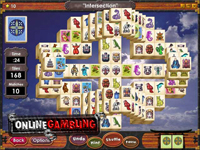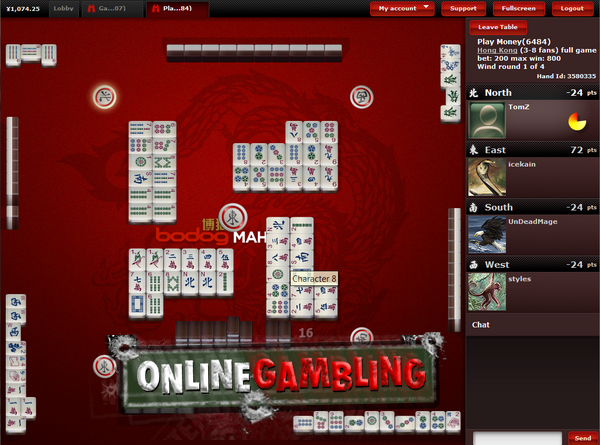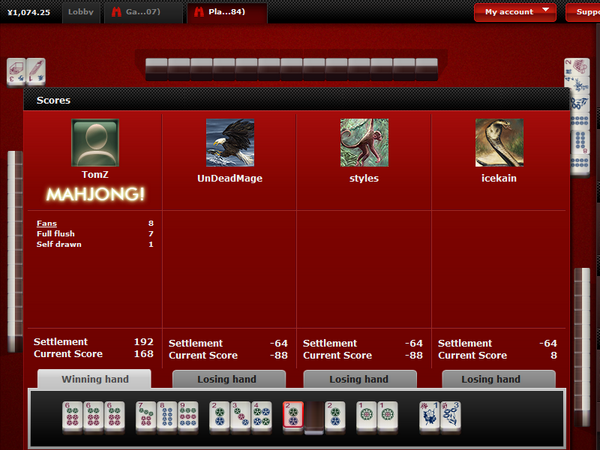 Originating in China, the (traditional) four player game of Mahjong (在线麻将) is now played all over the world and can even be played online, against live opponents, for money.
Originating in China, the (traditional) four player game of Mahjong (在线麻将) is now played all over the world and can even be played online, against live opponents, for money.
It’s a game of skill, calculated strategy and a small element of chance; it’s similar to poker in terms of being a game that you can actively improve in with practice. It is often said to be an easy transition for Rummy players due to the similarities in the two games.
Understanding The Game
To win a game of Mahjong, a player must be the first to build complete suit of tiles. The game is played with a set of 136 tiles (possibly +/- depending on the variation being played) of Chinese symbols and characters. Mahjong is the more common English translation of 麻將 (traditional Chinese) and 麻将 (simplified Chinese, pronounced “Ma Jiang”). Common English spellings include mah-jong, mahjongg, majiang, mah jong and mah-jongg. Common Cantonese spellings include, Màhjeuk Májiàng and Màhjeung.
The oldest version of the game is Chinese Classical Mahjong and the most commonly played version uses Hong Kong rules. There are many other variations with slight differences in the rules. In fact, most major cities and provinces in China have local rules that differ slightly from each other.
However, in the online world most people prefer standard Chinese or Hong Kong rules due to their (relative) simplicity.
Best Mahjong Sites for Players in United States
-
1
 Bodog88Great for United States players. Offers Hong Kong, Shenzhen and Riichi rules in real money, tournament and free play modes. Available in Chinese Simplified (简体字) and Traditional (繁體字), English, and Japanese (日本語) languages
Bodog88Great for United States players. Offers Hong Kong, Shenzhen and Riichi rules in real money, tournament and free play modes. Available in Chinese Simplified (简体字) and Traditional (繁體字), English, and Japanese (日本語) languages
Quick-start Instructions and Rule Sets
Classic Mahjong
This is the traditional rule set, similar in game play to Zerogan Hong Kong rules but without the red fives.
The basic premise of classic rules is that flower and season tiles are used and given bonus points. They can be declared one at a time at any time. Winds are rotated after each hand except on east win and draw.
When declaring Mahjong, four sets and pair of any value are sufficient, and all players’ hands are scored.
International/MCR/Chinese Mahjong
International Mahjong is also known as MCR (Mahjong Competition Rules). The basic idea when playing is that flower and season tiles are used to give bonus points and they can be declared one at a time at any time. Flower and season tiles that are given in the initial deal can also be declared and replaced before the game starts or kept for later. Winds are rotated after each hand and points are calculated in one step only.
At least 8 different fans are required to declare in MCR.
Japanese Riichi
Japanese Riichi is either Kansai style three player Riichi or EMA Riichi as defined by the European Mahjong Association. All Riichi games are played without red fives. Riichi has a few basic concepts that make it a slightly more involved rule set. First of all, flower and season tiles are not used and wind rotation is after each hand except if East wins or is Tenpai.
It is possible to declare Riichi on any hidden hand that only needs one more tile to be a winning hand. When playing Riichi online for money, 1000 points are placed, as an extra bet by the player declaring Riichi and the game continues with play until somebody wins or there is a draw. The individual who has declared Riichi may expand a pong to a kong if the right tile is drawn. If a player who has declared Riichi declines to go mahjong on a tile is still Riichi, but may then only declare on a drawn (not discarded) tile. The winner of the hand takes the extra 1,000 points. In the case of a draw in online Riichi, the points will be transferred to the next hand.
A player will become Furiten if he or she needs a tile that he or she has already discarded to go Mahjong. A player who is Furiten may only declare on a self-drawn tile. A player will stop being Furiten if he or she discards tile(s) so that the tile needed to declare is no longer the one that he or she has already discarded. A game ends if a player goes below 0 points. Players become Tenpai if nobody wins and they are only one tile away from a finishing hand.

This screenshot shows a typical game of Riichi Mahjong in action at B88
Rule Set Variations – EMA Riichi and Kansai style Riichi
In EMA Riichi all Simples (Tanyao) hands must be closed (i.e. a concealed hand), Twice Pure Double Chows (Ryan Peikou) must also be closed. Blessing of Man (going Mahjong on a discard in the first round) is allowed and is a yakuman and multiple Ron is allowed.
In Kansai style three player Riichi, players are East, South and West but never North and tiles 2-8 in the characters suit are not in the tile set. A pong of North scores 1 yaku, open or concealed and players are not allowed to claim discarded tiles to complete a chow, except when going Mahjong. Some yakus, such as Mixed Triple Chow cannot be achieved due to the lack of Character tiles, and when Going Mahjong, at least one yaku (fan) is required.
There are numerous special hands in Riichi that score one or more yakus. You can view the full scoring table on the Bodog88 website.
Hong Kong Rules
Hong Kong mahjong, the most popular and commonly played online version of the game, uses a fan-laak table for point calculation.
The main ideas behind Hong Kong Mah Jongg are that winds are rotated after each hand except on east win and draw, flower and season tiles (one of each) are used and can give fans and, most importantly, that points are never calculated; only fans matter!
When declaring mahjong in Hong Kong rules, a hand (including patterns) must be worth a specific number of fans to be eligible. The number of fans needed is specified in the name of the table. There is different fan values for different patterns. Only one player can declare and he/she is the first in turn to claim the tile in case of discard.
Shenzen/Bang-Bang Style
Bang Bang or Shenzen Mahjong is one of the most straight forward versions of the game and some say the most exciting. The basic premises are quite simple:
- The winner becomes (or stays) East. Other players are assigned winds based on their seating relative to the winner.
- Players are not allowed to claim discarded tiles to complete a chow, except when putting down a finishing set.
- Whenever a player draws a tile and extends an already declared pong to a kong, all other players pay the amount X to the player who performs the pong-to-kong.
- Whenever a self-drawn kong is declared, all other players pay the amount Y to the player who declares the kong.
- Whenever a player claims a discarded tile to declare a kong, the discarding player pays the amount X+Y to the player who claims the discarded tile.
- Points are never calculated; only kongs and going Mahjong matter.
- When a player declares on self-draw, a lucky tile is drawn for a potential extra bonus.
- If a player declines mahjong on a discard, only self-drawn tiles are permitted thereafter for that player.
- If any player at the table has less than 3Y in cash on the table, the game ends.
When laying down a finishing set, the player in question can declare with a hand consisting of four sets and a pair, or with 13 orphans, or with seven pairs. On win on self-draw, the other players pay the winner Y each. On win on discard, the discarder pays Y. And if a player wins by robbing a kong, the robbed player pays for the other players.

An example of a winning hand in Riichi format
Lucky Draw (Horse): If a player declares on self-draw (but not on robbing the kong), that player draws the next tile from the wall. If the winner is East and draws a East, 1, 5 or 9, the other players must pay the winner an additional Y. The same applies for South with South, red dragon, 2 or 6; West with West, green dragon, 3 or 7; North with North, white dragon, 4 or 8.
There’s no special hands or scoring in games that use Shenzen rules, only monetary settlement.
Game Types
Single Hand
A single hand of Mahjong; no wind rotation and no prevalent wind. The fastest game, but with less strategy as point score is reset after each hand.
East Only
About four hands, east is always the prevalent wind. Faster than full games but with greater strategic element than single hands.
Full Game
Full four-round game. Takes longer to play, but strategy is key; winning with a good hand can offset a few losses.
Tournament
Players are seated at tables and play for a fixed amount of time (a tournament round) before being seated at a new table. This is repeated a number of times and is dependent on the tournament setup. Bodog88 is currently the best site for playing tournament in United States, hands down.
Differences In Real Money and Play Money Games
There are three ways to play Mahjong online, for fun, for money or in a tournament. Tournaments are offered by operators like Bodog88 daily and they award cash and prizes to winners. In most tournaments you simply pay an entry fee and get to playing.
In cash games, gameplay is just like recreational games but you replace the point scoring system with a cash scoring system. Honestly, playing for cash adds a whole new, exciting element to the game. People are more serious and strategic then in free-play. You are putting your money where your mouth is and seeing who is the most skilled player out there.
Strategy Guide
Mahjong is considered a complicated game by many, simply because of the amount of choices and variables (hands) you have to work out. Below, we will try to provide you with some explanations of the different choices on offer during a traditional game, and give you some pointers that will give you an edge over your competitors.
It is a common beginners mistake to try and form as many sets as possible at the beginning of the game. Throwing together pungs, chows and kongs right off the bat seems like a good idea initially, but it can lead to problems later on. Essentially, you are giving the other players too much insight into your hand by melding too early. Your opponents can learn a lot about your hand from your melds coupled with your discards.
Melding early on also narrows the opportunities that may unfold later in the game. Having made one Chow, it is best to make the rest of your hand all chows and or all of the same suit. Remember chow hands aren’t the best. If you can build pung hands, you can also use the winds and dragons and you aren’t limited to the site.
As a general rule, never take a discarded tile unless you have a clear plan of attack for your hand and the tile will help you execute.
Having patience when playing always pays off. Remember that at the beginning of a game, there are many tiles in the wall. By not melding your tiles too early, your chances of completing a concealed hand increase dramatically.
Try to be flexible and don’t get too blinkered; many times a seemingly genius starting strategy to build your hand doesn’t materialize, you just have to roll with it and rethink your strategy, looking out for other winning possibilities.
Forming a pair when you only have only one tile is always more difficult than making a pung when you already have a pair. To put it plainly, don’t be too quick catching a matching tile to make your Pung, see what how the game plays out as you may pick up another pair.
** Want To Put These Tips To The Test? Play Mahjong Online @ www.Bodog88.com **
Towards the end of the game, watch the discards that are being made and the number of remaining tiles in the wall. It’s important to be aware of what tiles you discard, and as a general rule, try to discard only tiles that have already been discarded by the other players.
Finally, make sure that you aren’t supplying a high-scoring hand with better tiles. You may pay the price for this if a pure or clean hand is built. Particularly, watch out for players making a third meld in the same suit.
World Championship
In 2002 the first World Championship was organized by the Mahjong Museum, the Japan Mahjong Organizing Committee and the city council of Ningbo, China. One hundred players participated, mainly from Japan and China, but also from Europe and the United States. Miss Mai Hatsune from Japan became the first world champion.
European Championship
In 2005, in the Netherlands, the first Open European Championship was held, with 108 players. The first prize was won by Masato Chiba from Japan.
Mobile Apps
While there are plenty of iPhone and Android mahjong solitaire apps, for those looking to play Hong Kong, MCR or any other multiplayer variation on their mobile phone/tablet, for real money against real competitors, there is only a one real operator who offers this that we have uncovered:
www.MahjongTime.com is currently the only site who has a mobile and tablet version of their app that allows you to play for money when on the go. For a limited time, they are also offering a 200% deposit matching bonus to first time sign ups from United States.






